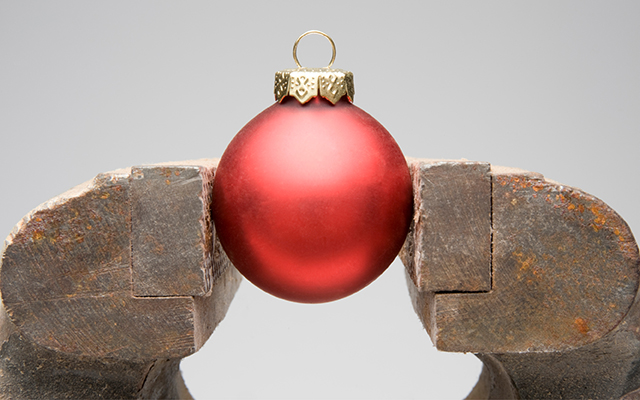If you lived on the high plains of Bolivia or in parts of Peru, you might have a big annual celebration in your life called Tinku. Tinku is something that has gone on probably since the 1100s, and it involves a couple of steps.
First, you prepare a traditional grain alcohol called chicha. Then, on the appointed day, you pack up and head for a city, drink chicha, and dance to the music of native pinquillo flutes. And then? You whip your friends and neighbors with leather cords and launch into semi-organized bare-knuckled brawls that might leave you bloodied in the streets and possibly dead. The brawling is entirely the point of Tinku, which has been variously described as a fertility ritual (the participants’ blood acting as a sacrifice for the future harvest) and as a way of preventing war (by allowing rival villages to settle their scores).
Don’t ask me. I don’t know.
If that celebration sounds crazy, consider a Midwestern family I know that has four daughters who, as adults, happened to settle in far-flung corners of the country. This family has a ritual. Every year, on Thanksgiving night, the mother and daughters leave their various Thanksgiving celebrations and board airplanes. They fly on these airplanes to one sister’s location (which changes nearly every year) and either wake up the next morning at dawn or never go to sleep, and hit the various shopping-mall Black Friday sales — the ones that start at midnight or 4 o’clock in the morning. As the sun sets that very night, bargains in hand, these sisters and mother jet off, to meet again at Christmas and present one another with the gifts they just purchased. (They like this so much that one sister once skirted airline advice and made this trip in her eighth month of pregnancy.)
I don’t know. It makes them happy. Who am I to judge?
Though I do have a sneaking suspicion that if I told the natives in the Tinku celebrations about the jet-setting bargain hunters, they might note that the cost savings of whatever was purchased would tend to be offset by the airplane tickets. That’s not the point, however. The point is that, when it comes to holiday celebrations, everyone else is crazy and I am sane.
I’m so sane that one time I drove two hours through a white-out blizzard to a rural Minnesota pie shop. I was there because I had invented my own ritual in my 20s: an annual early-December event I called the Pie and Whiskey party. It started the year I invited a few friends over to drink Irish coffee and have a slice of pie; I was particularly proud of an apple pie I had made with grated cheddar cheese in the crust. One thing led to another, and I soon owned 20 pie pans, and the party took a whole week of baking and planning.
Then, one year, I took on a huge last-minute freelance project that wouldn’t allow me any baking time. Trouble-shooting, I found a perfect substitute — this little pie shop 45 minutes out of town that made pies I loved. The fact that it was out of town made it feel a little more special to me — less like I was shortchanging my guests, more like I was providing them with something extraordinary.
The morning of the party, I awoke to find white-out blizzard conditions. Being a clueless New York native, I didn’t really know what that meant and headed out on rural prairie roads into the storm. It took me two hours there and two hours back, and the elderly woman who sold me the pies shook her head at me and told me not to drive. It remains, in a long life of boneheadedness, perhaps one of the most notably dangerous and stupid moments of my life. But it was terribly important to me. It was my ritual — my way of sending off the past year and expressing love to my little community. The pies were delicious. Even if they could have killed me.
My biggest memory of that day was not the happy celebration, even though it was indeed happy, but the way trucks would roar out of nowhere into my rearview mirror, practically on my bumper, or the way they would suddenly appear in front of me like walls. That’s what driving in a white-out is like. Don’t do it. Don’t have celebrations that you look back on in terror. Unless you love a good Tinku, of course, which is nobody’s business but your own. Well, your business and the people who meet you in the square for ritual bloodshed. For me, I’m currently trying to avoid celebrations that leave me bloodied, terrified and regretful.
How do I do it?
Well, first I had to come to terms with my perfectionism. As a card-carrying food snob, I can’t bear the thought of a Christmas or Thanksgiving table that isn’t centered around a sustainably raised, heritage-breed turkey or ham bought from a farmer with a name and an address.
As a working girl in publishing, I’ve had to come to terms with the fact that the days right before Thanksgiving and Christmas are some of the busiest of my year, times when I have to work in advance and triply well so that my coworkers get their holidays off. And as a typical child-comes-first yuppie parent, I’ve also had to come to terms with the fact that I don’t want to turn my back on my preschoolers after a long day of being away from them, and I am not at my best with my family if I stay up all night making stuffing after they go to bed.
So, our sustainable, carefully prepared Thanksgiving and Christmas feasts now come from a wonderful little restaurant that works with local farmers so that customers can stop by the restaurant the day before the holiday and pick up the various elements (such as a raw turkey, ingredients for a big pan of sage dressing, sweet potatoes whipped and seasoned with fresh ginger, and so forth), then assemble everything at home and pop it into the oven on your own time. Is this cheating? The more important question is: Is this good enough? I guess we all get to decide for ourselves.
I know when I was an idealistic 20-something, driving through white-outs both real and metaphorical (don’t ask about the relationship I was blindly groping through at the time), I would have scoffed at anyone calling themselves a real cook who outsourced a prominent holiday meal. But, for me, one of the unexpected pleasures of life on the far side of 35 is coming to understand what enjoying the moment means. It’s being present and open with the people in the room. For me, this year, that means sitting on the floor with my 2-year-old and putting babies to bed under blankets. And it’s listening to my 4-year-old as he puzzles out his own meaning of that old American folk song “Blue Tail Fly.” (He currently believes the line after “Jimmy crack corn and I don’t care” is “my monster’s gone away.” I don’t correct him.) And it’s letting someone else take the credit for the meal on the holiday table.
I suppose all celebrations are strange in their own way: When I was growing up, my mother used to shudder at the danger inherent in the real candles on one of our neighbors’ Christmas trees, while that neighbor would shudder in horror at the live, crawling Maine lobsters that crowded our deck before meeting their fate in a big boiling pot of water on Christmas Eve. In the end, finding your peace with whatever is strange about yourself, and making the celebration that works for your loved ones, is probably all any of us can hope for.
This originally appeared as “Tinku, Travel, Treats and Other Holiday Traditions” in the December 2010 issue of Experience Life.




This Post Has 0 Comments